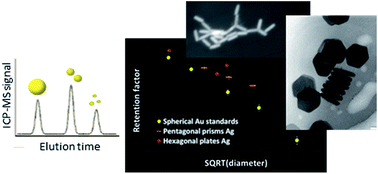Evaluation of hydrodynamic chromatography coupled with inductively coupled plasma mass spectrometry detector for analysis of colloids in environmental media – effects of colloid composition, coating and shape†
Abstract
In this study, we evaluated hydrodynamic chromatography (HDC) coupled with inductively coupled plasma mass spectrometry (ICP-MS) for the analysis of nanoparticles with different coating and shapes. Using two commercially available HDC columns (Polymer Labs-PDSA type 1 and 2) and a set of well characterised calibrants of different materials (Au(0), Ag(0), SiO2, polystyrene), coatings (citric acid and tannic acid), and shapes (spheres, rod-like prisms, and hexagonal plates) we demonstrated that temperature does not influence the size resolution and, therefore, can be adapted to the sample particularity. Retention behaviour was not influenced by the particle material. However, a minor influence of the particle coating was observed for tannic acid coated silver nanoparticles. Particle shape noticeably affects the retention behaviour and can lead to erroneous size estimation if spherical calibrants are used to determine their effective diameter. Using the ICP-MS detector in the single-particle modus made possible to discriminate between spherical and rod-like particles despite some limitations. However, the development of a comprehensive physical model for the elution behaviour of particles with complex shapes in HDC is needed for obtaining quantitative information about the shape using HDC. Our findings demonstrate that HDC-ICP-MS is a promising method for measuring the size and the concentration of spherical inorganic colloids in complex media and suggest that HDC may be increasingly implemented in environmental science.


 Please wait while we load your content...
Please wait while we load your content...